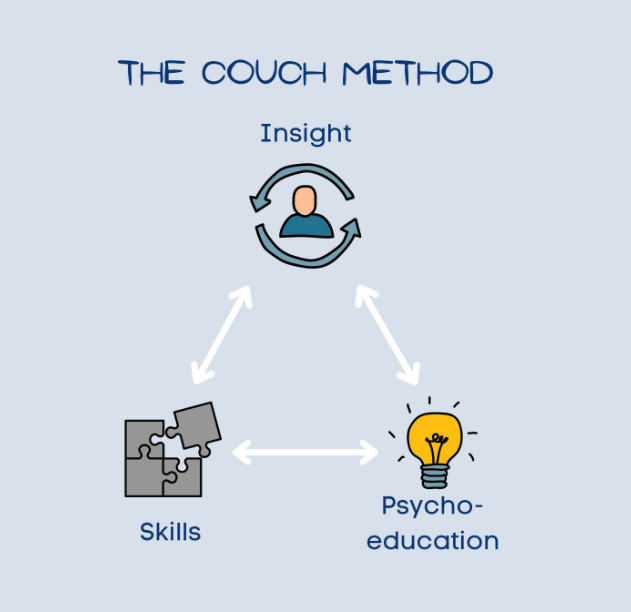
At The Couch Method, you are paired with an intentional therapist; a devoted human invested in their own wellness, growth and professionalism. At the start of therapy your
therapist will work collaboratively with you to identify goals for treatment and describe their treatment style. They will also encourage you to give them feedback- to let them know what you like and don’t like about your therapy process, so you can create an environment that feels safe and where you feel seen.
Therapists at The Couch Method are armed with many models and modalities of treatment including (but not limited to) Relational therapy, DIR Floortime Method, Psychodynamic Therapy, Family Systems, DBT (Dialectical Behavioral Therapy), ACT (Acceptance and Commitment Therapy), IFS (Internal Family Systems), Client Centered Therapy, EMDR, ERP (Exposure Response Prevention) as well as other trauma-informed and attachment-based interventions.
Consider taking a risk in your own wellness. It might just be the best choice you have ever made. Allow us to get to know all of your parts to help foster a more integrated and fulfilled you.



We all need it. The problem… sometimes our connections early on were problematic, confusing, inconsistent, traumatic,not enough. And these historical connections (or disconnections) will undoubtedly impact our relationships in the here and now.
The Couch Method was founded, with the understanding that traumatic experiences of disconnectedness and boundary violations leave lasting emotional and psychological scars- profound resonances of loneliness, longing, insecurity, fear, self loathing, shame and perfectionism.
Here, we understand that a large part of getting better, is learning to navigate boundaries and relationships effectively. It’s about learning how to soothe ourselves, be assertive, accept feedback, set safe boundaries, communicate effectively, and to love and make space for ourselves in the context of a relationship. Therapy can help us identify safe and unsafe boundary related patterns in ourselves and in others. Therapy could also assist us in learning how to have closer and more consistent friendships. And it’s sometimes a place where we explore why we seem to be drawn to the same type of people (even though we’ve identified that these people often hurt us). It’s about learning to stop numbing out, and to take a riskand to love and be loved.
Because a life of safe and meaningful connection is possible and you deserve that.
Severe and chronic boundary violations can be a sign of a personality disorder such as narcissistic personality disorder. If you are involved in a high conflict relationship, experiencing gaslighting, and or have difficulty taking up space in a relationship, please contact us for services. We want to help.